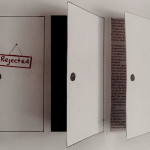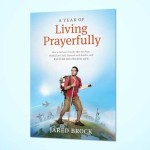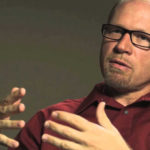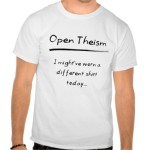We run our website the way we wished the whole internet worked: we provide high quality original content with no ads. We are funded solely by your direct support. Please consider supporting this project.
My Car Crash and the Open View
Last Saturday night Shelley and I were involved in a rather serious four car crash on a local highway. One person was hospitalized, and I’m being treated for neck pain and an on-going dull headache. But thankfully, no one was critically injured. In any event, the crash inspired several folks to e-mail or tweet questions regarding how I process this accident from an open theistic perspective, so I thought I’d address one of these questions in this blog.
Several people wondered if I believed that Shelley and I could have perhaps avoided this crash had we prayed for protection (if we didn’t) or if we and others might have been more seriously injured had we not prayed for protection (if we did). Great question! I absolutely believe praying for protection (and everything else) makes a significant difference in what comes to pass. In my view, God set up things up in the beginning such that his influence in the world is increased when his human partners align their will with his will through prayer. He wants to bring about his will “on earth as it is in heaven” through us. He’s looking for a bride who will reign with him on the throne (2 Tim. 2:12; Rev 20:6). So he’s given us tremendous authority to influence what comes to pass through prayer (as well as through other activities).
But I don’t believe prayer is magic. In my view, praying for protection doesn’t guarantee that you won’t get into a crash, or even that you won’t be killed. And the reason is not because it may be God’s will for you to get into a crash and get killed. The reason is rather that there are a multitude of variables extending back to the beginning of time that affect what comes to pass, including the free choices of human and spirit agents (e.g. angels, demons). I do not believe these other variables are completely overridden because someone prays.
One of the reasons many have trouble with this idea is that we tend to think of power in terms of coercion rather than influence. Hence, many assume that if prayer makes any difference it must make all the difference and thus guarantee a particular outcome. This is why most Christians assume that God’s will is the only variable affecting whether a person’s prayer is “answered” (that is, they “get” what they prayed for). If God wills what you pray for, in this view, he makes it happen: if he doesn’t will it, he won’t. By contrast, in the open view prayer increases God’s influence in the world (assuming that what you pray for is not contrary to God’s will), but it doesn’t cause God to coercively override all other variables.
It’s my conviction, therefore, that Shelley and I might have been more seriously injured were it not for the fact that we are continually covered in prayer (thank you prayer warriors!), but also that we might have been less seriously injured had we ourselves prayed for protection before our trip (which, I confess, we did not do). Things really hang in the balance on whether or not we pray! “If my people…will humble themselves and pray…then I will hear from heaven…and will heal their land” (2 Chron. 7:14).
If you ask me, it’s the classical view, not the open view, that has trouble making sense of prayer. For example, if it’s the case that God’s will is the only variable affecting what comes to pass, then it’s hard to see how prayer can make any real difference. If it was God’s will that we get into a crash, our praying otherwise couldn’t change this. And if it was not God’s will for us to get into our crash, then our prayers for protection are redundant. Prayer can make a difference only if things genuinely hang in the balance.
Along the same lines, according to classical theism all the facts about the future are exhaustively settled from all eternity. Some classical theists hold that God eternally willed these facts to be settled the way they are (Calvinism) while others hold that God simply eternally knows these facts to be eternally settled the way they are. Either way, the future is exhaustively settled. If this is the case, however, one has to once again wonder what difference prayer can really make. If it was an eternally settled fact that Shelley and I would be involved in a car crash on November 6th, 2010, there’s simply no way it could have been avoided, whether by prayer or any other means. (By the way, my objection to this view is not rooted in an assumption that whatever is settled in the future must be causally determined, as Bill Craig repeatedly alleges in the podcast I discussed in my previous two posts. My objection is rather rooted in the conception of the future as exclusively a domain of exhaustively settled facts. The issue over how these facts came to be settled is problematic, to be sure, but it is irrelevant to this particular objection.)
If we instead think of the future as partly open and conceive of divine power in response to prayer along the lines of influence rather than coercion, these (and many other) problems are avoided. Prayer doesn’t magically override the multitude of variables that affect what comes to pass, but it is itself a powerful variable. We can take it on faith that prayer is always “powerful and effective” (Ja 5:16). In some situations, variables are such that the increased divine influence is able to bring about what we pray for, in others not. Yet, if what we pray for is in line with God’s character and will, we can trust that things would have been worse had we not prayed.
Think about it – and keep praying!
Category: General
Tags: Open Theism, Prayer
Related Reading

What is the significance of Hosea 8:5?
The Lord asks, “How long will they [Israel] be incapable of innocence?” The Lord’s continual striving with Israel regarding their lack of innocence suggests that this question was not merely rhetorical. If God knows the future to be eternally settled, however, he could not in earnest ask this (or any other) question about the future.…

How Calvinism Misses the Point About Salvation
Calvinists sometimes argue that various passages in John teach that the Father chooses and then “draws” certain people to Christ. Those who are “drawn” certainly come to Christ (John 6:37) while all who are not drawn remain in their sin. For example, John portrays Jesus as repeatedly teaching that “no one can come to me…

Guest Post: Reasons Why You Should Pray More
Despite the fact that the Bible is full of prayerful people, most churches today don’t pray very much at all. In fact, we barely talk about prayer, even though it’s one of the most foundational pieces of the Christian faith. I recently went on a 37,000-mile prayer pilgrimage around the world, a modern re-working of…

Why Can’t God Stop Evil? The Thomas J. Oord Interview (podcast)
Greg and Thomas talk about Open Theism and how Greg’s views differ from Thomas’s. Theology nerds, get your compass and your flashlight and prepare to go DEEEEEP in the weeds! Thomas’s book: God Can’t Episode 487 http://traffic.libsyn.com/askgregboyd/Episode_0487.mp3

What Does ‘Your Faith Has Healed You’ Mean? (podcast)
Greg discusses faith, doubt, and healings. Episode 486 http://traffic.libsyn.com/askgregboyd/Episode_0486.mp3

